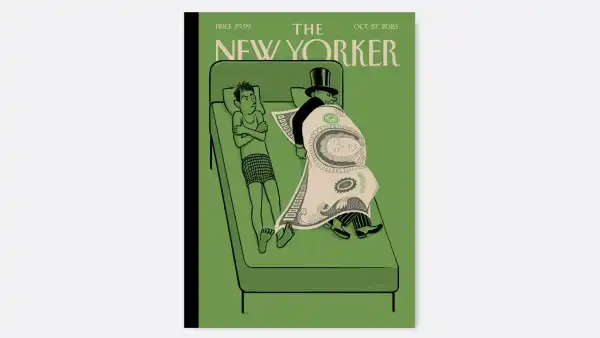
The writer and director Sam Mendes’s new film, “Empire of Light,” centered on the employees of an English movie theatre in the early nineteen-eighties, belongs to a genre unto itself: cooking-show cinema. Mendes seems to have given himself a list of mandatory ingredients and develops the film to fit them all in, however clumsily. There’s no intrinsic problem with conspicuous contrivance or a willful cinematic collage, whether involving the Marx Brothers or the New Wave. The trouble with Mendes’s film is in the effort to combine the pieces in a way that feels natural, in an artifice that’s devised to be nearly invisible. It’s a synthetic that presents itself as organic. In the process, the film smothers its authentic parts, never lets its drama take root and grow, never lets its characters come to life.
Olivia Colman stars as Hilary Small, the so-called duty manager of a spectacularly appointed movie theatre in a provincial seaside town on the southern coast of England. (The movie was filmed at Margate.) She is on the cusp of middle age, and her solitude appears to weigh on her. She lives alone, she eats alone, she seems to have little social life outside of her cordial association with her colleagues. At the start of the action, just before Christmas, she has recently returned to work after a stay in a mental hospital; at her doctor’s office, she tells him that she’s feeling “numb,” which he attributes to the lithium that she takes. (She lies to him about having family and friends to talk to.)
Hilary is also having an affair, of sorts, with her boss, Mr. Ellis (Colin Firth), the theatre’s general manager, who is married. She’s a reader with a fund of poetry to quote, seemingly a literary person who appears out of place in her daily role overseeing ticket sales, dispensing popcorn and candy, cleaning the theatre, tidying Ellis’s office, and organizing the other half-dozen or so employees’ time and tasks. She doesn’t seem bored, she doesn’t seem miserable—she merely seems mechanical. Then Ellis hires a new employee to help with ticket sales and other practicalities, Stephen Murray (Micheal Ward), a cheerful and eager young man whose elegant wit and easy curiosity sets him apart from the others; he and Hilary become fast friends, and then lovers. (He’s the first to pursue the friendship; she’s the first to demonstrate romantic feelings.) Stephen harbors the unfulfilled ambition go to university to become an architect. Hilary encourages him to pursue his dream, and, thanks to him, she begins to come out of her shell.
Stephen is Black, a fact that’s of no significance among his white colleagues, who are friendly and welcoming, but one that proves to be of appalling importance in general. He is confronted in the theatre by a patron who makes racist remarks, and the town is infested with white supremacists who, emboldened by British nativist politicians and enraged by Black British people’s demands for equal rights, harass Stephen in the street and turn increasingly dangerous. Meanwhile, his relationship with Hilary begins to take a toll on both of them, as their co-workers begin to suspect something.
Hilary is reprising the kind of relationship that she and Ellis have had—not just one among colleagues but one between a supervisor and a subordinate. That—along with (perhaps) the racial difference, along with (perhaps) the age difference, along with (perhaps) the fact that Stephen is still grieving over a failed romantic relationship with another woman, along with (perhaps) his academic ambitions—comes between them and threatens to push Hilary into crisis mode. That crisis, a story of past troubles and past horrors, of a hard childhood and subsequent abuses, of thwarted dreams and stifled rage, is the emotional core of the film.
Hilary is something of a classic character: a sad sack. In American movies, a sad sack is a sociopath-in-waiting, a ticking time bomb preparing to explode, whereas a British sad sack is merely a human machine going through the motions of life, a ticking clock that is simply winding down. American society, thin on formalities, exerts little pressure on solitary characters, whereas British life, which is more formal and punctilious, may add structure to lives that otherwise have little of it. That’s where “Empire of Light” is at its best; in treating Hilary like a compressed figure, shaped from the outside by social forces, Mendes tries (and, to a limited extent, manages) to show not the character but the forces themselves, to show the mold into which the character has been pushed, deformed, tormented. But the dramatic result of showing the mold rather than the character is the lack of detail in characterization—which wouldn’t be an issue if the movie weren’t a character study.
Mendes builds the movie mainly in dialogue scenes that often start promisingly, that show his protagonists confiding and confessing, struggling to express themselves and beginning to find the strength to do so. But they are typically cut short (whether by Mendes’s editorial will or by the mere limit of his own screenwriterly imagination) once the scene dispenses the tidbits of information that fit into the tight dramatic mosaic. It’s a movie filled with its perhapses and its vaguenesses, and the characters turn up only enough cards to keep viewers guessing at the table. The movie plays ambiguously with Hilary’s illness, to significant symbolic ends but frustrating dramatic ones: Mendes suggests that it’s the unchallenged assumptions of social life, of gender relationships, that are sick—that what Hilary has endured is enough to depress and derange any woman sensitive enough to take stock of the dire situation. It’s a rhetorical notion that the film places alongside the overt racist pathologies afflicting England; Mendes, in putting an age gap between Hilary and Stephen, also suggests a changing generational approach to endemic abuses and systemic injustices.
The movie’s motives and premises are its strengths. Its utter absence of detail, nuance, inner life, and complex expression are its failures. Its connection to the world of movies, as a subject, is simply incongruous, although the theatre itself is a virtual character in the film—the building is a kind of masterwork of populist modernism, and its slender yet slablike parts and its asymmetrical perpendicularity are meshed with Art Deco details and lavishly comfortable furnishings. Hilary has little connection to movies, but a great one to the building itself—and to past graces that it harbors, ghostlike, in a shuttered upstairs ballroom that formerly hosted dances. (The theatre’s marquee still advertises that erstwhile attraction.) Her association with it remains (yes, again) unspecified. As for the cinema itself, its glories are incarnated by the theatre’s longtime projectionist, Norman (Toby Jones), who decorates his booth with the iconography of classic movies and their stars. Norman talks about the equipment of 35-mm. projection with love and initiates the curious and technically adept Stephen in that love, too.
“Empire of Light” gets its title from the wry illusions of Magritte, but reflects none of their self-deflating humor or conspicuous delight in deception. Rather, it builds to a grand, nostalgic, sentimental paean to the art of popular movies, and does so with no irony, no sense of history, no self-questioning of the art form itself. Mendes doesn’t contemplate or hint at the connection between the Hollywood movies (and the British hits) of the era and the social crises that he diagnoses, between mass media and mass politics, between the mores of movies and the ways of private life and public discourse. Instead, Mendes nostalgically connects himself to a fading and troubled past, without ambivalence or self-doubt, as if he had the recipe for its redemption. ♦
Sourse: newyorker.com






